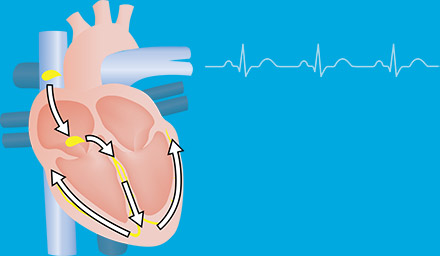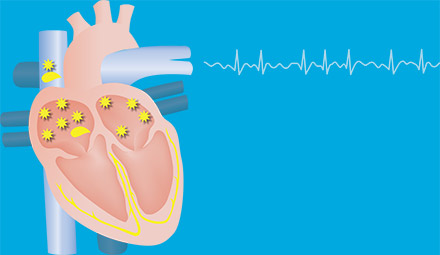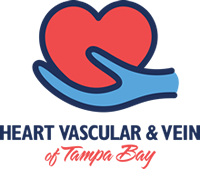What is Atrial Fibrillation?
Suspected AFIB Conditions That May Require Heart Monitoring
SUSPECTED ATRIAL FIBRILLATION
Atrial fibrillation (also referred to as AF or AFib) is a common condition in which the upper chambers of the heart, or atria, fibrillate. This means that they beat very fast and irregularly so the heart can’t pump blood effectively to the rest of the body.
AFib is a serious medical condition that can increase the risk of stroke by five times and over time, could lead to heart failure.
NORMAL HEARTBEAT
A small pulse of electric current spreads quickly through the heart to make the muscle contract.

ATRIAL FIBRILLATION
In atrial fibrillation, the heart’s upper chambers quiver faster than the rest of the heart.

If left untreated, AF as a disease continues to progress. There are three main types of AF:
- Paroxysmal (occasional) – AF occurs from a few seconds to days, then stops on its own
- Persistent – AF will last for more than seven days and will not correct on its own
- Permanent – AF is a consistently high, erratic heartbeat that cannot be corrected
WHAT HAPPENS WHEN I EXPERIENCE ATRIAL FIBRILLATION?
SYMPTOMS
- Irregular heartbeats
- Thumping or pounding heartbeats
- A feeling that the heart is racing
- Chest discomfort
- Fainting or light-headedness
- Fatigue, shortness of breath or weakness
However, some people have no symptoms and discover that they have AFib at a doctor’s appointment. Even for people who have no symptoms, AFib is a serious medical condition that can lead to complications.
MANAGEABLE RISK FACTORS
Some risk factors that contribute to AFib can be controlled or modified, like managing high blood pressure and reducing alcohol consumption. Controllable risk factors include:
- High cholesterol
- High blood pressure
- Heart disease
- Smoking
- Excess weight
- Metabolic syndrome
- Stress
- Alcohol abuse
- Lack of exercise
- Some medications
- Sleep apnea
- Thyroid disorders
NON-CONTROLLABLE RISK FACTORS
- Family history
- Advancing age
- Heart disorders from birth
- Gender — males have a higher incidence of AFib
For more information please review the patient brochure below:
CAUSES
The causes of AF are often unclear. In some cases, AF may be the result of:
- Heart abnormality from birth
- Damage to the heart structure from a heart attack
- Heart valve problem
People with otherwise normal hearts may also develop AF.
HEART MONITORING CAN UNLOCK THE ANSWERS
If you have atrial fibrillation (AFib), or your doctor suspects that you do, heart monitoring may be necessary to determine how often and how long it occurs.
Sometimes episodes of AFib are infrequent and require longer-term monitoring and in some cases, your doctor may also want to monitor how effective different treatments are at keeping your AFib under control. Types of heart monitoring vary in terms of how long they can be used and how information is captured:
- Holter Monitors
- Event Recorders
- Mobile Cardiac Telemetry Systems
- Insertable Cardiac Monitoring Systems
Learn More About Heart Monitors
TALK WITH YOUR DOCTOR
These talking points will help you remember important information related to your symptoms to share with your healthcare team.
REMEMBER TO SHARE:
- A description of your symptoms (if applicable)
- The number of episodes you’ve had in the past 2 years
- What you were doing before you had symptoms
- Any concerns you have (e.g., safety, your job, driving)
- Any treatments you are receiving for your heart
- If your family has a history of heart conditions
- How your symptoms are affecting your home and work life
REMEMBER TO ASK:
- How will you determine if I have a heart condition?
- What tests will you perform?
- Would long-term monitoring with an insertable cardiac monitor lead to a faster diagnosis?
- What should I do when I experience symptoms?
- Should I be concerned about my symptoms?
- Will I need treatment? If so, what kind of treatment? What other alternatives are there?
- Do I need to restrict any activities?
- Is it safe for me to exercise and go about my other daily activities?
- Should I see a specialist?
Information on this site should not be used as a substitute for talking with your doctor. Always talk with your doctor about diagnosis and treatment information.
